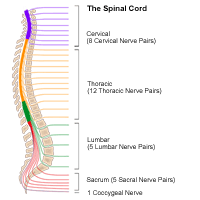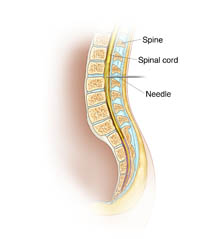Nerve Blocks
Nerve blocks are procedures that can help prevent or manage many different types of pain. They are often injections of medicines that block pain from specific nerves. They can be used for pain relief as well as total loss of feeling if needed for surgery.
Perhaps the best-known nerve block is an epidural. Many pregnant women ask for an epidural during childbirth to ease the pain of labor and delivery. In an epidural, the provider injects an anesthetic medicine into the space surrounding the spinal cord.
About nerve blocks
Nerve blocks require needles, often along with a fluoroscope (live X-ray), ultrasound, or CT scan to properly guide the needle. The healthcare provider may also use low-level electrical stimulation to locate the nerve causing pain. The needles and guided images are used to inject pain-relieving or anti-inflammatory medicines around a nerve or group of nerves.

Click Image to Enlarge
This numbs the area or relieves inflammation. Sometimes chemicals or surgery is used to intentionally damage or cut the nerve. Nerve blocks halt the pain messages coming from the nerves in a certain part of the body.
Types of nerve blocks
Nerve blocks can be temporary or longer lasting. Healthcare providers may give them with local anesthesia after numbing the area where the needle enters the skin. They can also block pain signals to an area by deliberately cutting or destroying certain nerves during surgery.
These are types of surgical nerve blocks:
-
Sympathetic blockade. The healthcare provider gives a medicine to block pain from the sympathetic nervous system in a specific area.
-
Neurectomy. A damaged peripheral nerve is surgically destroyed.
-
Rhizotomy. The surgeon destroys the root of the nerves that extend from the spine.
These are types of nonsurgical nerve blocks:
-
Epidural analgesia or anesthesia. The healthcare provider may inject medicine in the area surrounding the spinal cord.
-
Spinal anesthesia or analgesia. The healthcare provider may inject medicine in the fluid surrounding the spinal cord.
-
Peripheral nerve blockade. The healthcare provider may inject medicine around a target nerve causing pain.
Benefits of nerve blocks
Nerve blocks can be used to manage chronic (long-term) pain, pain after surgery, or severe acute (short-term) pain. Nerve blocks ease pain by offering immediate relief. They can also offer longer-term relief, because some injections reduce irritation to the nerves to let them heal.
Nerve blocks can help people who have chronic pain function better in their daily lives, allowing them to go to work, exercise, and do daily tasks.
Temporary nerve blocks are often a short-term fix. The pain may return in just a few hours after the medicines wear off. Some people may need repeated or even long-term nerve block treatments to manage inflammation and pain.
Common uses for nerve blocks
Nerve blocks are often used during surgeries to ease pain. They may also be used to manage the pain of chronic health conditions or injuries in which the nerves are damaged, inflamed, or irritated.
Nerve blocks are commonly used to manage pain that comes from the spine, as well as debilitating pain that affects the arms, legs, neck, and buttocks.

Click to Enlarge: Example of epidural insertion
You and your healthcare provider may discuss a nerve block to manage these types of pain:
-
Labor and delivery pain
-
Pain after surgery
-
Cancer-related pain
-
Arthritis pain
-
Severe facial pain, like trigeminal neuralgia
-
Low back pain
-
Headaches, including migraines and occipital neuralgia
-
Chronic regional pain syndrome, or CRPS
Other uses for nerve blocks
Healthcare providers may use a nerve block as a tool to find out what is causing your pain and where it is coming from. By judging how you react to a temporary nerve block and how it affects your pain, your healthcare provider can better figure out the reason for your pain, where it is located, and how to best treat it.
Risks of nerve blocks
Like all procedures, nerve blocks carry some risks. A nerve block can lead to bleeding and infection where the shot was given. The medicine may also spill into other areas unexpectedly, and healthcare providers may hit the wrong nerve during surgery. Compared with many procedures, though, nerve blocks appear to be quite safe.
Who should not have nerve blocks?
You may not be a good candidate for nerve block if you:
-
Have an infection at the site of the injection
-
Are on anticoagulants or have a bleeding disorder
-
Have prior nerve problems in the area of the nerve being injected